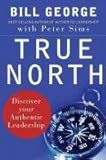 Do you know any leaders who were once great, but lost their way? That is the central theme behind the second chapter of True North: Discover Your Authentic Leadership. Here is the exercise that follows that chapter.
Do you know any leaders who were once great, but lost their way? That is the central theme behind the second chapter of True North: Discover Your Authentic Leadership. Here is the exercise that follows that chapter.
The True North exercises:
- Introduction Exercise
- Chapter 1: Your Story Exercise
- Chapter 2: Losing Your Way Exercise
- Chapter 3: Your Greatest Crucible Exercise
- Chapter 4: Knowing Your Authentic Self Exercise
- Chapter 5: Practicing Your Values and Principles Exercise
- Chapter 6: Your Motivations and Motivated Capabilities Exercise
- Chapter 7: Building Your Support Team Exercise
- Chapter 8: The Integrated Leader Exercise
- Chapter 9: The Purpose of My Leadership Exercise
- Chapter 10: Empowering Other Leaders Exercise
- Chapter 11: Honing Your Leadership Effectiveness Exercise
Why Leaders Lose Their Way
Have you seen leaders lose their way or worked with someone who fits any of the archetypes particularly well?
Yup. Countless times. I’ve heard of many political leaders rise to power through the support of their people, only to fall to corruption and become overthrown by those same people.
Thinking about this brings to mind the theory that people are promoted to the point of incompetence. The theory describes people that are promoted because they’re doing a great job in their current role, without regard for how well they’ll do in the next level.
What are the behaviors and warning signals you have seen in others at risk of losing their way?
Arrogance is perhaps the main warning sign I’ve seen. They become enamored with themselves and believe they are incapable of doing no wrong. Some go as far as to surround themselves, consciously or unconsciously, with Yes People too. ‘Tis quite a shame.
Derailment
Can you see any of the qualities of the Imposter in yourself?
Note: An Imposter is someone who rises through the organizational ranks with a combination of cunning and aggression. They understand the politics of getting ahead and let no one stand in their way.
Nope. I believe people should rise based on proven merit and potential aptitude for the next role ahead. I was once given the opportunity for a promotion, but turned it down because I knew I wasn’t ready yet and another person would fit the role better.
Can you see any of the qualities of the Rationalizer in yourself?
Note: A Rationalizer is someone who always appears on top of the issues, yet when things don’t go his/her way, he/she blames external forces or subordinates or offer facile answers to his/her problems.
Nope. It’s important to know the root causes of problems, especially when it’s yourself. Without such impartial self-awareness, it’s impossible to improve.
Can you see any of the qualities of the Glory Seeker in yourself?
Note: A Glory Seeker is someone who defines himself/herself by acclaim of the external world. Money, fame, glory, and power are his/her goals, as he/she pursues visible signs of success.
There may be a bit of this in me. Anyone who has a blog is seeking some measure of fame. If someone says otherwise, that person doesn’t understand the nature of a blog.
I don’t want to be a celebrity though. That kind of lifestyle is not for me. But I wouldn’t mind a room in a library named after me – after I’ve made a substantial difference to that community, of course. I’ll happily accept recognition if I earn it, but will never put my kids in a balloon (or not) just to get some fame.
Can you see any of the qualities of the Loner in yourself?
Note: A Loner is someone who avoids forming close relationships, seeking out mentors, or creating support networks. They believe they can and must make it on their own.
Nope. Nothing pumps me up more than to meet with people smarter than I and listen to their advice. One of my roles in life is as a constant student. In that role, I am always learning. Everyone around me is a teacher. There is something I can learn from everyone, if I listen carefully and keep an open mind.
Can you see any of the qualities of the Shooting Star in yourself?
Note: A Shooting Star is someone whose life centers entirely on his/her career. He/she is always on the go, rarely making time for family, friendships, his/her community, or even himself/herself.
Nope. My family is the most important thing in my life. I’m doing all of this for my family, after all. I’ll never compromise my time with my family.
Losing Your Way
Can you envision a situation in which you could lose your way in the future?
It’s difficult to envision that, though anything is possible. Of the derailment roles listed above, I suppose the one that holds the most risk for me is the Glory Seeker. I like to think that I’m grounded enough to never pursue fame over my family or business though. That just sounds insane.
To what extent are you prepared to go your own way and be your own person, despite external pressure?
I’m prepared all the way man! The path of an entrepreneur is full of external pressures. It’s our job to balance them and make intelligent trade-offs.
Do you have a fear of failing? In what ways? Is it because you are afraid of what other people would think about you? Is it personal pride?
No, I’m not afraid of failing. I rather welcome it. I expect to fail many times before I succeed.
That’s not to say I will be a failure. I am just realistic about the life of an entrepreneur and have my expectations set accordingly. Failure is really an opportunity to learn. Therefore, I welcome failure and look forward to the education it will impart to make me a better entrepreneur, leader, father, and person.
How is your fear of failing impacting your decisions about leadership and your career? Are you consciously or unconsciously avoiding situations in which there is a risk of failure?
I suppose I don’t need to answer this question if I’m not afraid of failing. To failure, I have this to say: In the words of Joe XXX, “Bring it on!”
How could the experience of failing help you achieve your ultimate goals?
I just wrote about this above. Failure is really an opportunity to learn. The more I learn, the easier it is, and closer I get to my ultimate goals.
In what ways do you crave success?
I crave success in myself, with my family, in my business, and in my community. The answers are broad because the vision for each is broad.
In myself, success means maturity, health, happiness, rewarding challenges, and peaceful contentment. With my family, I want the same as I want in myself, such as a healthy & happy family. In my business, success means self-sustaining profitability, the betterment of the lives of our customers, and a happy & rewarding place to work for my employees. In my community, it means some kind of improvement in the lives of my neighbors and community members.
How is your craving for success impacting your decisions about leadership and your career? Are you consciously or unconsciously choosing situations that give you a high probability of success?
My desire for succeeding in my life goals has a strong and conscious influence over the choices I make. The positions and roles I’ve held have all been a conscious stepping stone towards entrepreneurship, for example. This career in the web and the flexibility it offers was also a conscious decision, so that I could work from home often and spend more time with my family.
How would you answer these questions?
The True North exercises:
- Introduction Exercise
- Chapter 1: Your Story Exercise
- Chapter 2: Losing Your Way Exercise
- Chapter 3: Your Greatest Crucible Exercise
- Chapter 4: Knowing Your Authentic Self Exercise
- Chapter 5: Practicing Your Values and Principles Exercise
- Chapter 6: Your Motivations and Motivated Capabilities Exercise
- Chapter 7: Building Your Support Team Exercise
- Chapter 8: The Integrated Leader Exercise
- Chapter 9: The Purpose of My Leadership Exercise
- Chapter 10: Empowering Other Leaders Exercise
- Chapter 11: Honing Your Leadership Effectiveness Exercise



